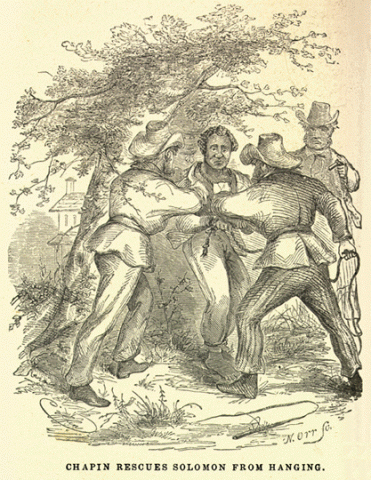The following errors have occurred:
- Please login or signup for a membership to continue enjoying the free trial of AwesomeStories. This is a necessary step to help us communicate new features and stories to our members. Thank you!
-
Table of Contents
- 0. STORY PREFACE
- 1. Slave Pens in Washington
- 2. Platt’s Journey to Slavery in Louisiana
- 3. Life as a Louisiana Slave
- 4. Life as the Slave of John Tibeats
- 5. Life as a Slave of Edwin Epps
- 6. The Beating of Patsey, the Slave
- 7. Platt Meets Bass
- 8. Bass Helps Platt (Solomon Northup)
- 9. A Plan for Freedom
- 10. Solomon Northup Goes Home
- 11. Not-Guilty Verdicts at Trial
John Tibeats, in a fit of rage, hangs Solomon Northup ("Platt") from a tree, allowing his feet to barely touch the ground. This image, from Northup's book 12 Years a Slave, depicts the scene which took place on William Ford's plantation. Chapin was Ford's overseer. The image is positioned between pages 114 and 115 of Northup's original book. Image online, courtesy "Documenting the American South," via University Library, University of North Carolina at Chapel Hill.
In 12 Years a Slave, Solomon Northup tells us that William Ford was a kind master. John Tibeats, however, could not have been more different.
Solomon describes his legal relationship with Tibeats:
He was my master, entitled by law to my flesh and blood. (12 Years a Slave, page 109 of an online version of Solomon Northup's book.)
Resentful of Solomon, who had once helped Ford to better transport harvested wood down the river, Tibeats consistently looked for ways to humiliate “his slave.” Once, while constructing a building at the Ford plantation, he strung-up Solomon after the slave had defended himself (thereby avoiding a beating).
Tibeats left Solomon hanging from a tree with his feet barely able to touch the ground.
Hours later, William Ford’s overseer, a man named Chapin, came to Northup’s aid. He prevented further harm to Solomon with these words which he addressed to Tibeats and his collaborators:
...I have been overseer on this plantation for seven years, and, in the absence of William Ford, am master here. My duty is to protect his interests, and that duty I shall perform.
You are not responsible - you are a worthless fellow. Ford holds a mortgage on Platt of four hundred dollars. If you hang him, he loses his debt. Until that is canceled, you have no right to take his life.
You have no right to take it anyway. There is a law for the slave as well as for the white man. You are no better than a murderer. (12 Years a Slave, pages 115-116 of an online version of Northup's book.)
Chapin, however, did not cut-down Solomon. Northup was not set-free, from the tree-hanging episode, until William Ford, returning to his plantation, cut him down.
Solomon was still in danger, however. No matter how grandly Chapin spoke of laws protecting slaves, application of those laws required witness testimony in the event of a murder. As Solomon notes:
Had he [Tibeats] stabbed me to the heart in the presence of a hundred slaves, not one of them, by the laws of Louisiana, could have given evidence against him. (12 Years a Slave, at page 90 of an online version of Northup's book.)
That’s because black people were not allowed to testify against white people at the time, no matter how heinous the witnessed crime.
To protect himself, from Tibeats’ revenge, Solomon ran away to the great Cocodrie Swamp (likely misreferenced, in the Narrative, as Pacoudrie Swamp). There he would face dangers of a different sort, including alligators (until he found his way through the bayou).
-
Table of Contents
- 0. STORY PREFACE
- 1. Slave Pens in Washington
- 2. Platt’s Journey to Slavery in Louisiana
- 3. Life as a Louisiana Slave
- 4. Life as the Slave of John Tibeats
- 5. Life as a Slave of Edwin Epps
- 6. The Beating of Patsey, the Slave
- 7. Platt Meets Bass
- 8. Bass Helps Platt (Solomon Northup)
- 9. A Plan for Freedom
- 10. Solomon Northup Goes Home
- 11. Not-Guilty Verdicts at Trial


 Back
Back
 Next Chapter
Next Chapter

 Back
Back
 Next Chapter
Next Chapter